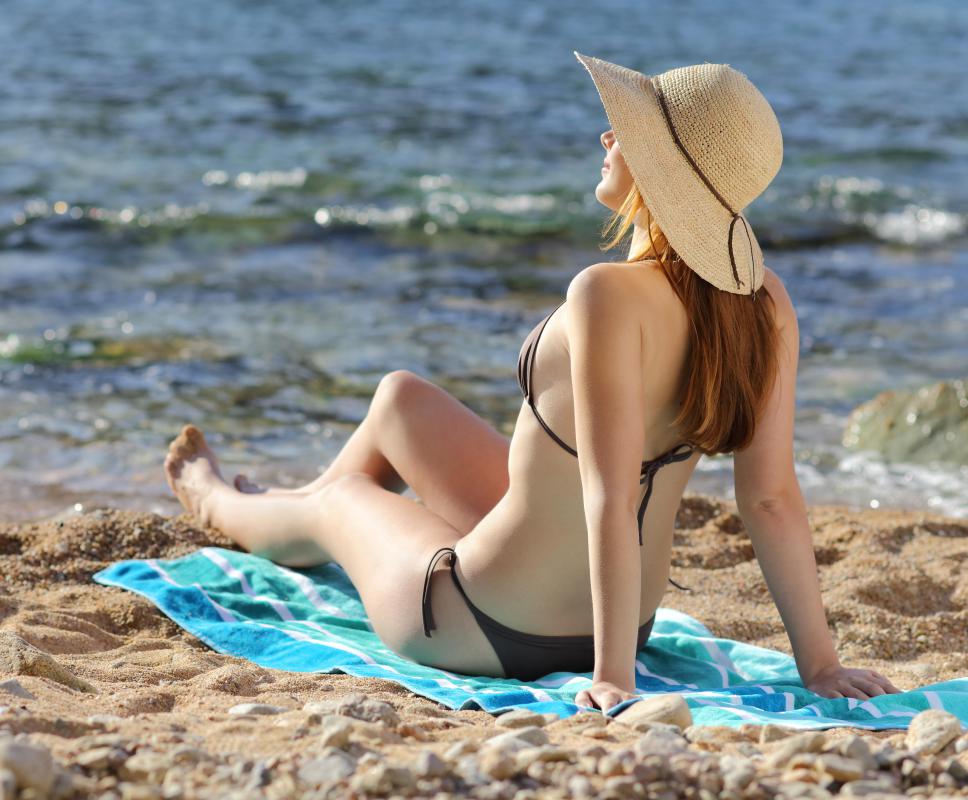At TheHealthBoard, we're committed to delivering accurate, trustworthy information. Our expert-authored content is rigorously fact-checked and sourced from credible authorities. Discover how we uphold the highest standards in providing you with reliable knowledge.
What is a Sun Rash?
Sun rash, more properly known as photodermatitis, is an allergic reaction to light which causes the skin to develop a rash. The rash is typically reddened, thickened, and blistered, and it can be extremely itchy. Although a sun rash looks very similar to a sunburn, the root cause is different, and frequent rashes can be a cause for concern, as they may indicate the presence of a medical problem which has increased the body's sensitivity to light. You may also hear a sun rash referred to as “sun poisoning.”
Fair-skinned people are at increased risk of developing photodermatitis, but people of all skin colors can experience it. It can be caused by some medications, such as birth control pills, along with exposure to chemicals, certain foods, and some medical conditions, like lupus. People develop a sun rash because their skin has become extremely sensitized to light, and as a result it may take only a few minutes of exposure for a rash to develop. If the rash happens repeatedly, it can thicken the skin around the site, and sometimes lead to skin cancer.

Treatment for the condition is similar to that used for sunburns. Cool compresses can help with the itching and burning sensation, as can soothing lukewarm baths with oatmeal, baking soda, or cornstarch. Topical applications of calamine lotion, aloe vera, or hydrocortisone can also help ease the symptoms, and antihistamines can reduce the itching and swelling. If the rash breaks open, a trip to the doctor is recommended, as the patient may need antibiotics to prevent infections.

After someone gets a sun rash, it is a good idea to make a list of what he or she was exposed to in the day or so prior to the development of the rash, to see if any risk factors stand out. People who are taking medications which can cause photosensitivity are usually warned, but it's a good idea to check through the patient information packets on any medications in use, just to eliminate an obvious potential cause. If a pattern of rashes develops, it may indicate the patient needs to see a doctor to check for an underlying medical cause for the condition.

To prevent sun rash, people should wear sunscreen, hats, and sunglasses outdoors. Protecting the eyes during a period of photosensitivity is especially important, as sun exposure can cause damage to the eyes over a prolonged period of time. Loose-fitting clothing should be used to cover the body and keep cool in warm weather
AS FEATURED ON:
AS FEATURED ON:



















Discussion Comments
I just spent a week at the beach and returned with my first ever sun rash on my legs. I am blonde with fair skinned, so I'm typically pretty cautious - however,I took a prescription NSAID (for a herniated disc) two days before I sat out in the sun for about 20 minutes without sunscreen. Rookie mistake!
I was greatly fatigued the next day at the beach, though I took care to stay in the shade. Now I'm itchy and swollen and have been slathering myself with Aloe Vera gel and Nivea lotion - those seemed to work okay. I take Claritin every day for hay fever and I've also been taking ibuprofen every six hours.
Today I tried Aveeno Skin Relief Lotion and hydrocordisone, but that combo hasn't worked as well. For those of you who've experienced this before, how long should I expect the symptoms to last?
I have had the problem of sun rash for a number of years and am fighting off scratching as I write this, having been in the sun to get a tan within the last week. I have the rash all over my chest and upper arms, and to a lesser degree on my back. Oddly, my legs, which have been exposed the same amount of time, do not show the rash at all. Peculiar, at least to me.
At any rate, I've taken a variety of antidepressants for most of the last ten years and found out through my own study that the antifungal griseofulvin (Grisactin) is also a potential source of sun sensitivity. Call me old, old-fashioned, reckless (because of the known risks of sun exposure), stubborn or any combination of the above, but I look better with a tan and love to go to the beach so I’m just going to ride it out when it happens.
I have found that generous application of plain old over-the-counter hydrocortisone cream does a lot of good. Considering that it’s an allergy I’m also going to try taking 25-50mg of Benadryl before going out and see if that helps.
For GameHunter 00: Everything you describe their having has been listed as symptoms of sun (poisoning) rash. The lightheadedness, nausea and fatigue are most likely from just getting too hot. While I've never had lightheadedness or nausea after being out in the sun too long, I have on many occasions had the fatigue.
Heat does sap the energy out of you, for sure. When this happens, make sure everyone has plenty of fluids (water's good, sports drinks or PediaLyte are better) and rest in a cool place. I wouldn't worry much either but watch him and how long he's outside.
@gamehunter00: The leukoderma, as mentioned, is a possibility. It is also called hypopigmentation. It can even be hereditary.
There is also a condition called vitiligo. It is a pigmentation disorder. It can even turn hair white. It can be triggered by sunburn. Either way, I would definitely get it checked to make sure that it is not something more serious.
@gamehunter00:More than likely, the white patches you described are what are called leucoderma. It is usually caused by overexposure to the sun. It is not known to be dangerous but it is always best to consult a doctor if it doesn’t go away.
Anaphylactic shock is a very serious and possibly life-threatening condition caused by an allergic reaction. An allergen enters the bloodstream and causes a reaction through the entire body. It is very serious and requires immediate attention.
Medicchristy- Thank you for answering back. This weekend we stayed at a hotel in town as sot of a mini vacation. Well, we used plenty of SPF 45 spray sun block and applied frequently. My wife stayed in the shade, but my son was in the pool for a long time each day.
He didn’t get sunburn, just a tan on his body; however this morning we found white splotches on his face. What should we do? And what is an anaphylactic shock?
@gamehunter00 - More often than not, sun poisoning only poses a mild reaction and can usually be successfully treated. In your case, there seems to be some underlying problem going on with your wife and son. The fact that they have such severe reactions seems cause for concern to me.
While I am no doctor, I do think that perhaps a trip to the dermatologist or even an allergy specialist would be a good idea. Sometimes, certain medications such as an antihistamine can be used in more severe reactions. The thing that concerns me is that if they are having such reactions, they could have an anaphylactic reaction. I was a Paramedic for many years and I know several people that carry an Epi-pen for severe allergic reactions. Good luck to your family!
My wife and son are very sensitive to direct sunlight. They get white or red dry splotches with raised bumps, it looks like they have hives all the time. They also get lightheaded, nauseous and my wife says they get real tired. I didn’t know there was anything called ‘sun poisoning’, that doesn’t sound good at all. We live in one of the states with the driest heat too. Most of the summer they spend indoors so they don’t get sick and they always wear sun block. I’m more worried about my son because his doctors aren’t concerned, should we question it more?
Post your comments